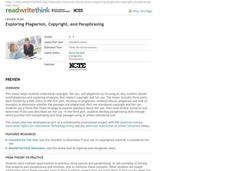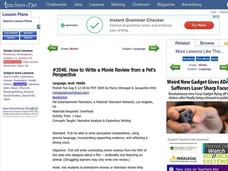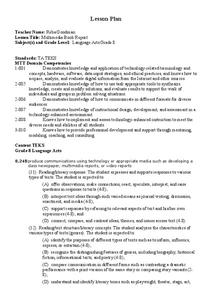Curated OER
Introduce Vocabulary: Franklin Goes to the Hospital (Bourgeois)
Franklin the turtle is on another adventure in Paulette Bourgeois' book Franklin Goes to the Hospital, and there are plenty of new words for your young readers to explore as they hear this story. Although you can include more,...
Turabian Teacher Collaborative
How to Find a Research Question
There are so many fascinating topics and concepts to learn about in the world. But where do you start? Begin formulating questions for an argumentative research paper with a guided practice instructional activity. After coming up with...
Curated OER
How to Use Expanded Form
Third graders write numbers in expanded form. For this math vocabulary lesson, 3rd graders write numbers in expanded form using words only, words and numbers, and numbers only. Each student is given three dice to roll. They then write...
Library Sparks
Reference Tools Vocabulary Challenge
Young scholars love the opportunity of going to the library to jump into that one comfy chair in the whole room with a book, or be a lucky one to get to the computers before anyone else. But knowing how to locate books and other...
Literacy Design Collaborative
Using Textual Evidence to Analyze Literary Responses to Historical Events
Scholars analyze Animal Farm to learn how to add textual evidence into essays to support their ideas. They search for a deeper meaning to the story and how it relates to the text Totalitarianism and Revolutions in Russia. To finish,...
Curated OER
Comic Book Characters
Explore gender stereotypes by analyzing how male and female characters are depicted in comic books. Using the provided Comic Book Analysis sheet, students record the attributes of male and female comic book characters. Then the whole...
Curated OER
Word Reference Materials
A class discussion on reference materials opens up a lesson on how to use these important resources. They discover that dictionaries, glossaries, and thesauruses are called word reference resources, and they practice using them. The...
ReadWriteThink
Exploring Plagiarism, Copyright, and Paraphrasing
Plagiarism, copyright, and fair use are the focus of a three-part instructional activity designed to inform scholars of how to properly cite others' work. First, pupils use a KWL chart to begin thinking and...
University of the Desert
How Do I Feel That My Culture Is Misunderstood by Others?
Using video clips of young adults from around the world describing their cultures and how they can be misunderstood, learners compare their own cultural point of view to that of others through discussion and writing.
Curated OER
Introduce Vocabulary: Have You Seen Bugs? (Oppenheim)
Are your scholars interested in bugs? Get future entomologists excited about vocabulary through Joanne Oppenheim's colorful book Have You Seen Bugs? They use the informational text (although this strategy is useful for any book) to...
Curated OER
Introduce Vocabulary: Hot Air: The (Mostly) True Story of the First Hot-Air Balloon Ride (Priceman)
What a fun way to explore new vocabulary words! Marjorie Priceman's book Hot Air: The (Mostly) True Story of the First Hot-Air Balloon Ride offers plenty of new words for scholars to learn in context: amateur, assembled,...
Curated OER
Introduce Vocabulary: Sorting (Pluckrose)
Find guidance to introduce math vocabulary in context using Henry Pluckrose's book Sorting. This text is an excellent cross-curricular resource for budding readers. Before starting, review some new vocabulary words: collect, common,...
Curated OER
How To Make an Apple Pie and See the World
Students have a class discussion on how the variety of foods we use on a daily basis come from all over the world. They identify foods that they are familiar with that come from other places.
EngageNY
Writing the Children’s Book: Day One
With a brief mini-lesson plan, scholars learn about using strong verbs, sensory details, and precise descriptions. Next, pupils continue working on their children's book storyboards before choosing their strongest pages for peer...
Teachers.net
How to Write a Movie Review from a Pet's Perspective
When would two paws up denote a blockbuster film in your classroom? Only when young writers create movie reviews from a pet's perspective in this imaginative expository writing practice. This engaging topic begins with a class discussion...
Curated OER
I Hate to Complain but your Cheese Stinks
Students read and discuss the "fractured" fairy tale "The Stinky Cheese Man". They imagine that they are in the fairy tale and write a letter of complaint concerning the Cheese Man and how he stinks up the town.
PBS
Copyright and Fair Use
When is using someone else's copyrighted material appropriate? Learn about copyright and fair use with a instructional activity from PBS.org. Scholars read through a reference sheet about authors' rights and users' rights, and then...
Curated OER
Ralph Ellison's Invisible Man: Anticipation Guide
A fan of anticipation guides? This resource not only offers directions on how to craft such a pre-reading activity, but also provides a model for Ralph Ellison's Invisible Man.
Curated OER
Encyclopedia Introduction
Second graders demonstrate how to use reference materials. In this library media lesson, 2nd graders are introduced to the encyclopedia and are shown how to use the encyclopedia as a reference. Students use encyclopedias to complete a...
Curated OER
Multimedia Book Report
Young readers plan and draft a book report focusing on the five key components of a novel: plot, character, setting, conflict, and theme. After completing a story board, pupils then prepare a PowerPoint book report that is shown to the...
Curated OER
The Book Thief: Discussion Questions
Expand your study of The Book Thief by Markus Zusak with a question for each level of Bloom's Taxonomy. These questions focus on part four of the novel; each is paired with at least one quote from the text for context and teacher...
Roald Dahl
The Twits - The Monkeys Escape
Houses come in all shapes and sizes, but not all houses are safe from Mr. and Mrs. Twit. The 10th lesson in a unit designed to accompany The Twits by Roald Dahl turns learners into architects. While designing houses for the monkeys, they...
Curated OER
Using Informational Books: Index, Table of Contents & Alphabetical Order
Students recall and use previous knowledge of the library's reference and nonfiction sections. Also they utilize various forms of reference (encyclopedias & dictionaries) and nonfiction books.
Novelinks
The Book Thief: Anticipation Guide
Introduce the major themes in Markus Zusak's award-winning novel, The Book Thief, with an anticipation guide that asks readers to agree or disagree with a series of statements.

























